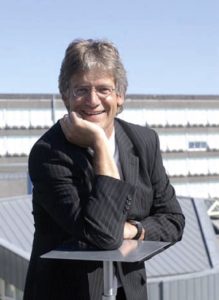
Obituary for Prof Dr Otmar Loffeld
On 7th April, Siegen lost Otmar Loffeld – an internationally acclaimed researcher in the field of radar engineering and sensing as well as a passionate teacher. His colleagues at the University also lost a welcoming, warm and pleasant friend.

Prof. Loffeld had a relationship with Siegen University for almost 40 years. He came here as a young doctoral student after receiving his diploma in electrical and communication engineering from RWTH, Aachen. He was awarded a doctorate from Siegen in 1986 followed by a Habilitation in 1989. After research assistantship in the fields of information processing in Siegen, he was offered the Chair of Estimation Theory and Digital Signal Processing in Siegen in 1991. He had been with Siegen since then. He retired recently; however, continued to be very active in research and had regular interactions with colleagues and students.
Over these many years of association with Siegen University, Prof. Loffeld was instrumental in a number of activities and placed Siegen at the world map of research in wide arrays of areas including Compressive Sensing, Kalman filtering, optimal filtering, estimation theory and process identification, synthetic aperture radar (SAR) processing and simulation, SAR interferometry, and bistatic SAR processing. Over 70 doctoral and 2 habilitation theses were supervised by him. His students and colleagues, originating from all over the world, knew that they could always rely on his kind and wise advice and support.
Prof. Loffeld served as a dynamic leader of the Centre for Sensor System (ZESS) until his retirement. The centre grew to bring together researchers across the discipline divide to design, build and test innovative sensory systems for a range of applications. Since 2020 he has been a senior member of ZESS. He also served the department of Electrical and computer engineering as its speaker in 2014-2015. He was a thoughtful person, whose contributions to the growth of research and teaching at the University were highly regarded and carefully listened to.
His last project, the Marie Skłodowska-Curie Innovative Training Network (ITN) “Menelaos-NT” brought together 12 partners from 6 countries to train the next generation of researchers in novel electronic sensors. It is still an ongoing project funded by the European Commission and the entire team is saddened. In 2002, he founded the International Postgraduate Program (IPP) “Multi Sensorics,” and in 2008 established the “NRW Research School on Multi Modal Sensor Systems for Environmental Exploration and Safety (MOSES)” at the University of Siegen. In 1999 he was the Principal Investigator (PI) on Baseline Estimation for the X-Band part of the Shuttle Radar Topography Mission (SRTM) where his team contributed to DLR’s baseline calibration algorithms. He was also the lead investigator in the German TerraSAR-X add-on for Digital Elevation Measurement mission and in bistatic Hitchhiker experiments with stationary receiver and TerraSAR-X illuminator.
Over the years, he forged a strong relationship with the Fraunhofer Institute for High Frequency Physics and Radar Techniques in Werthhoven-Wachtberg.
Internationally, he was widely regarded. The Taiyuan University of Technology in China elected him a visiting professor in 2019. He was a senior member of the Institute of Electrical and Electronics Engineering (IEEE). His stellar research brought him a number of prizes over the years. In 1990, he received the Bennigsen-Förderpreis in NRW for his research on “Doppler-Centroid-Estimation für X-SAR-Anwendungen mit Kalman-Filtern“. He received best paper awards from IEEE Geoscience and Remote Sensing Transactions in 2007 for his work on “Bistatic SAR Processing and Experiments” for a “very significant contribution to the field of endeavor of the IEEE GRS Society”. Yet another paper won the best paper award in IEEE ICET-2008. In 2011, he received the VDE-ITG Best paper award for his paper on “Bistatic SAR Experiments With PAMIR and TerraSAR”. The University of Siegen awarded him its Diesterweg-Ring for his outstanding contribution to the internationalization of doctoral education at the University of Siegen in 2005.
He leaves us a legacy of over 300 publications, 3 books on estimation theory, grateful students, colleagues and vital additions to the knowledge base of humanity. We will miss a gentleman, a considerate and highly-respected colleague.
Department Electrical Engineering, Computer Science and the Members of the Centre for Sensor Systems (ZESS)

[…] late Prof Dr Otmar Loffeld supervised the beginnings of Patrick’s PhD, so we are especially happy that with a […]